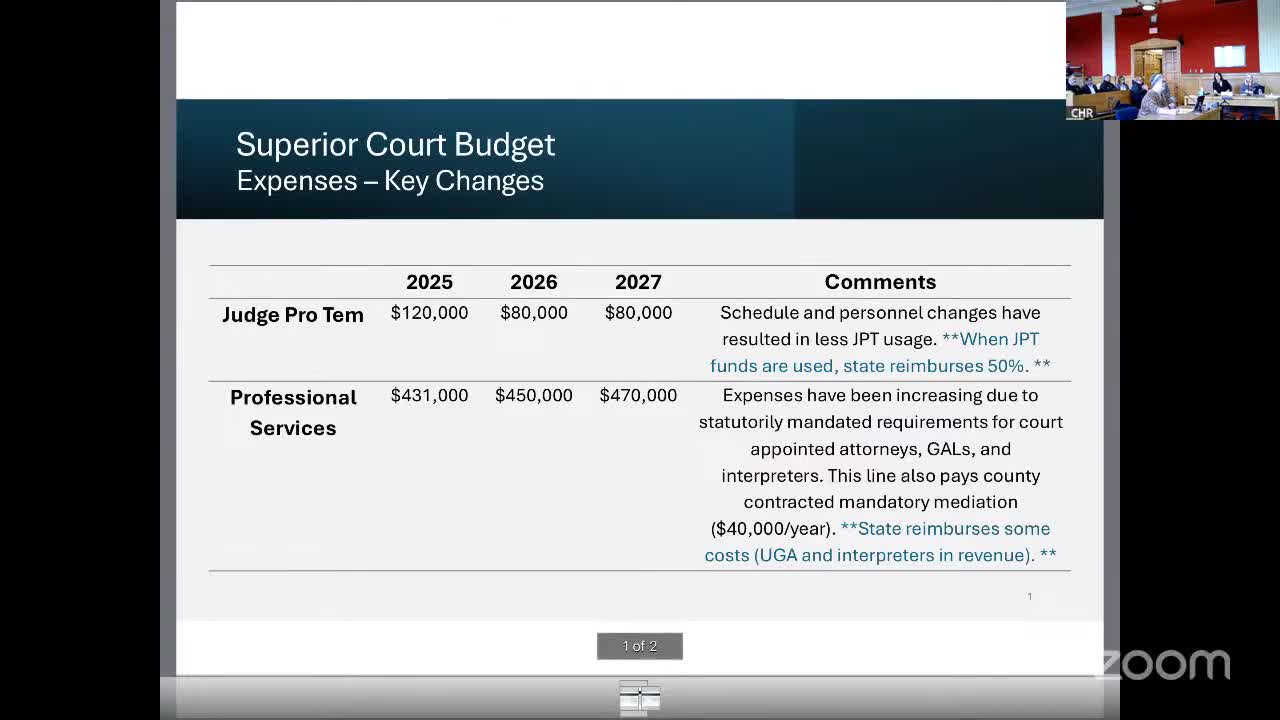Superior Court, therapeutic courts present modest budget shifts as reimbursements and grants change
Get AI-powered insights, summaries, and transcripts
Subscribe
Summary
Judge Marilyn Hahn and court staff told commissioners they are proposing modest 2026 budget adjustments while professional services and some grant reimbursements change.
Judge Marilyn Hahn, presiding judge of Superior Court, and Danielle Paul, superior court administrator, told the Cowlitz County Board of Commissioners during a budget workshop that the court is proposing only modest changes for 2026 but is managing rising costs for state‑mandated services.
“We are asking to reduce that by 40,000,” Danielle Paul said of the judge pro tem line, attributing the reduction to schedule and personnel changes that have lowered the amount of pro tem time used. Paul added that the state reimburses about half of pro tem costs when they are used.
Paul said the court is proposing an increase to its professional services line because of higher costs tied to state‑mandated services, including guardian ad litems, court‑appointed attorneys, court visitors in minor‑guardianship cases and interpreters. She told commissioners the county receives some state reimbursement for those services but not full costs. The court also pays approximately $40,000 per year for the county’s mandatory mediation contract.
Dallas LaGrange, manager for the county’s therapeutic courts, described budget shifts driven by personnel allocations and grant timing. LaGrange said salaries historically funded in the general fund will show a reduction in 2026 largely because some case managers were moved to be funded from opioid‑dollars for that year. He said that internal service charges (IT, risk management and industrial accident) make up roughly $96,000 of the therapeutic courts’ services line and recommended that when personnel move to opioid funding, the related internal service charges should follow the personnel to keep accounting consistent. “No stone unturned,” LaGrange said about seeking additional revenue for the program.
Commissioners asked for clarification on grant prospects referenced by LaGrange. He said a CJTA grant administered by Health and Human Services is expected to provide a conservative estimate now (roughly $32,050 in the draft) but the county has not yet received the final award; depending on certification and final award, that number could increase. He also noted the therapeutic courts received sizable mental‑health tax transfers in 2025 and that those supplementations have affected prior budgeting.
Why it matters: the courts’ changes are small in isolation but reflect growing state reimbursement uncertainty and rising costs for court‑mandated services. The way personnel and internal overhead are allocated across funding sources affects the general fund and specialty grant balances for 2026.
Speakers quoted in this article are limited to those who appeared in the workshop and are listed below. No formal motions or final votes on the courts’ 2026 budget were recorded in the transcript provided.
Ending note: court leaders said they will return with any finalized contract items (for example, the mediation contract) when those agreements are ready for formal board action.
